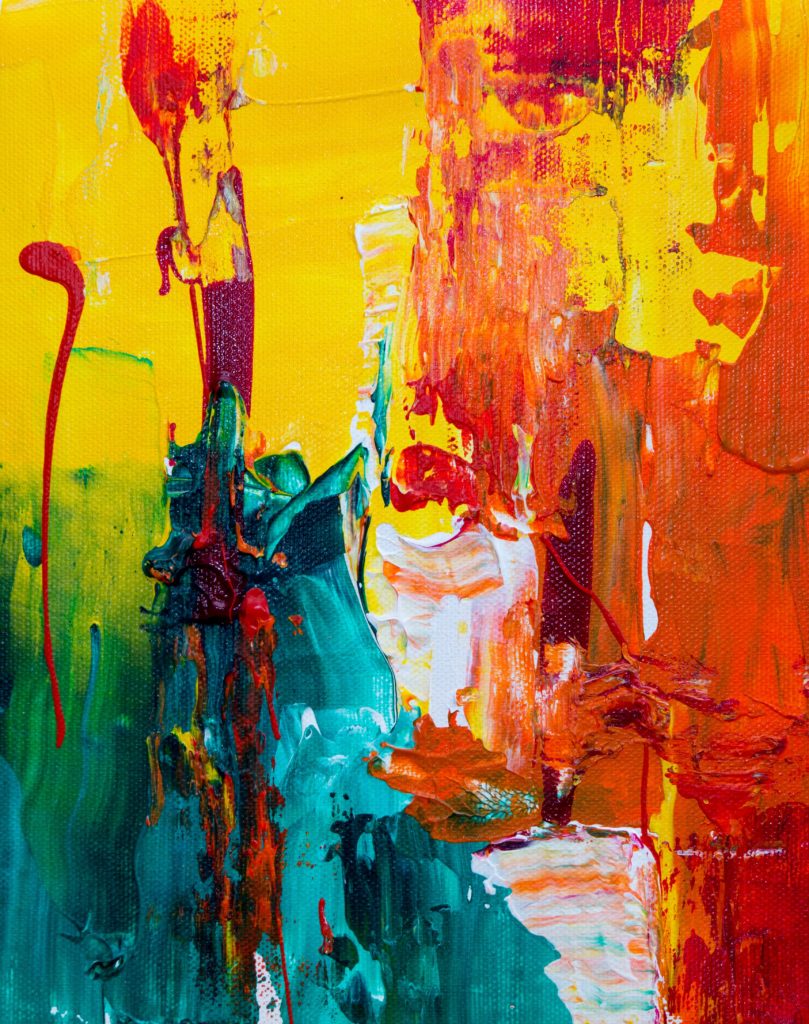
Jennifer Silvey
Worlds Colliding
Atmosphere folds into atmosphere:
the graveyard free falls into the castle.
Tombstones rain down from the sky
and pound the roof.
Coffins tumble down marble stairs;
skeletons spill out and pile together.
Angelic statues fall through the ceiling
and crush reliquaries.
A sudden epitaph exhibit in the Great Hall:
a gravestone with a cryptic message rests
before the king’s throne.
Depart from me, I never knew you.
Matthew 7:23
With gravitational tilt, the gas station
flops into the steak restaurant.
A gas leak explosion singes raw meat.
The steaks turn into fire sprites;
they’re laughing, those wicked fire pixies.
Cowboy boots, onion blossoms, and cigarettes
levitate and swirl together as the jukebox
wails out Johnny Cash.
And it burns, burns, burns
the ring of fire.
The gas station charms interrupt
the steakhouse rituals.
Cars pile together into a mass, into a giant meteor:
the steakhouse its crater.
A deluge of candy, chips, and hotdogs. The cold
refrigerated world: her liquid nitrogen, her solidifying
craze, her below-freezing pitch, all ring in the Arctic.
Icebergs in beer, soda, and juice
squelch the burning Phoenix in the kitchen.
Robert Frost lifts a steak knife. His dinner
ruined as settings somehow unhinge.
I think I know enough of hate
To know that for destruction ice
Is also great
And would suffice.
_______________
Jennifer Silvey lives in the St. Louis area with her husband, their two cats, and their dog. She studied digital film for her bachelor’s and creative writing for her master’s. She earned both degrees at Missouri State University in Springfield, MO. Her book of poetry, Midnight Galleries, is getting published through LCk Publishing.
Author’s Comments:
Genesis
I worked on “Worlds Colliding” off and on since 2015. I didn’t feel like I had the right connecting elements until 2021.
Two catalysts inspired it. The first came from grad school. In a critical theories class, we had a conversation about settings and the power of why certain events happen in certain places. You don’t have weddings at gas stations, you don’t expect operas on submarines, and politicians don’t discuss legislation at the circus (or they shouldn’t). This theory is called spatialization. It ultimately looks at how social practices are connected to the right space and time.
I was inspired to write the poem a couple of years later while watching Seinfeld reruns. George Costanza has a famous line about “Worlds Colliding.” George adamantly thought that no one should let different social groups overlap. He was worried people would learn too much about him and that it would change the scope of his relationships, and essentially, his world.
After watching that episode, I wanted to craft a poem that tested what would happen if settings attacked each other. Under the poem’s premise, the rules for our reality become malleable. Physics, in a way, is liberated from its rules (even if haphazardly).
Crafting
I liked the idea of a castle getting overwhelmed by a graveyard and a steak restaurant getting attacked by a gas station. For me, imagery was the guiding force when settings attacked, and those resulting images were compelling to me. I’m also a sucker for lore, so I liked the idea of mythical beasts awakening amid the chaos.
To help the piece transition, and gain some grounding, I included quotes from the Bible, Johnny Cash, and Robert Frost. Each person’s quote is a comment on the tectonic shifts taking place in the setting. The comments are also eerie, hinting at the end of one thing and a bridge to something else.
I wanted something spooky from the Bible, particularly an unsettling verse from Jesus. I looked up some verses and “Depart from me, I never knew you” got my attention. The verse is pretty disturbing, considering Jesus is supposed to be the savior of all people. He’s the inclusive one, so it begs the question — what did you do to offend him?
The last part I added to the poem was the section with Robert Frost and his dinner. The poem was increasingly becoming a nod to the famous “Fire and Ice” poem, so it seemed right to bring the poet to the table.
Editor’s Notes: A clash of colors symbolizing the poem’s theme (abstract impressionism by Steve Johnsom on pexels.com)
